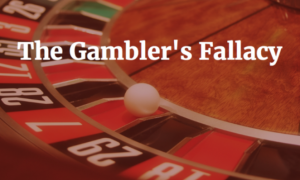There’s many terms that you will hear around the gambling world, but one of the most intriguing is “The Gambler’s Fallacy” which is used to refer to times when players believe they have a system or a trick that can give them an advantage in games that are often based entirely on luck.To be fair, you don’t need to look to the gambling industry to find examples of superstitions that are based on very little, but taken immensely seriously by those who have them.Sports people are famed for their strange pre and post-game routines, for example, but it’s in the gambling world that such things are most apparent, to the extent that they have been given a name, The Gambler’s Fallacy.
What is the Gambler’s Fallacy?
The Gambler’s Fallacy is perhaps one of the easiest psychological phenomena to explain, and has an interesting history.Also known as the Fallacy of the Maturity of Chances, it’s unsurprising that a shorter name, The Gambler’s Fallacy, became used.That isn’t the only name this phenomenon has though, it is also called the Monte Carlo Fallacy, and the reasons for that are historical and intriguing.The phrase Monte Carlo Fallacy comes from a famous incident in 1913 at the Monte Carlo Casino involving a game of roulette.In case you are new to casino games, roulette is a simple game, a wheel with 18 black and 18 red sections, numbered 1-36, and a green zero, is spun while a small ball is sent the other way, the ball lands in one of the segments, and if you have bet on the right number or colour, you win.As such, roulette is entirely a game of chance, but that doesn’t stop players from assuming there is a certain logic to it.On this occasion, that assumption was ripped apart quickly as the wheel landed on black 26 times in a row, with players betting on red assuming that it had to land on red soon because of the law of averages.However, this logic falls apart with games of chance, because this was not 26 connected spins with each being less likely than the last to land o black, black sections did not get removed from the wheel after the ball landed in them, and, as such, every spin was an entirely independent occurrence, meaning on the 26th spin, the odds of the ball landing on red or black (or, indeed, green) were exactly the same as they had been with the first spin.
Try it yourself
This all sounds simple and logical, and it may be easy to think to yourself “I would never get lost in such fallacies” but the truth is, in the heat of the moment, most players do, the feeling that your luck has to change, or that you’ve spotted a pattern in an entirely random game, is a tough one to argue.However, you can, at home, carry out a few experiments that will remind you of the random nature of games of chance.Take ten rolls of a dice, or ten flips of a coin, and watch the result, ten fair coin flips may result in five landing on heads and five landing on tails, as is statistically the most likely outcome, but as every flip of the coin is entirely independent, if you land heads, there is still a 50/50 chance of landing heads again, and after that flip, there’s another 50/50 chance.In simple terms, you are not taking ten flips of a coin that have any bearing on each other, they are ten independent coin flips, each one with a 50/50 chance of going to heads or tails.
How do the Casinos Win?
Now, this is the point where those who have issues with The Gambler’s Fallacy may well start to think they’ve seen something we haven’t, because if all games are random, and winning or losing becomes no more or less likely with each spin of the roulette wheel, or hand in a card game, or spinning of the reels of a slot, how can the casinos guarantee they’re going to make money?It’s a simple question, but those who are familiar with the world of gambling, and especially casinos, will be comfortable of the answer to it, house edge.The house edge is an advantage that the casino openly has in games, every game has a house edge of some kind, and it’s usually between 2% and 10%, although in the case of instant win games such as scratchcards, as well as a few slot games, it can be more than 10%.The opposite of the house edge is the return-to-player, or RTP, which is another way The Gambler’s Fallacy can involve itself.The RTP of a game may be 98%, for example, which means statistically, a player will receive 98p back for every £1 they wager on a game.However, these averages are taken via thousands of hypothetical games, and do not state in any way that that 98p return is guaranteed, it could be less, it could be more.However, gamblers may find themselves having lost a lot more than the house edge after a few unlucky rounds, and therefore feel like if they keep playing the average will build back up, but that isn’t how it works.The average isn’t per player, so while one player is losing money, another may be winning big, and between those two players, the average will play out.Things like house edge and variance/volatility of a game do have a bearing on the chances of winning, but a miniscule one, games of chance will always be games of chance, and anything can happen on any hand or spin.
Systems
The most notable way that the Gambler’s Fallacy shows itself is within systems. It’s become a cliché of the casino world by this point for a player to confidently say “I have a system” before being surprised to see their money vanish.Some systems have a basis in logic, like the Martingale system, which involves doubling your bet every time you lose.On paper, this system makes sense, but under even a small amount of scrutiny you realise that is only true if your funds are unlimited, if your bets keep getting bigger, and luck doesn’t fall your way, you’ll only accomplish emptying your account quicker.Also, most games have a limit, and once you hit that limit and are no longer able to raise your bet, the Martingale system, again, falls apart.
Can I Avoid It?
The best way to avoid the Gambler’s Fallacy is to keep one fact in your mind at all times, you are not smarter than random chance.It sounds like a silly thing to say, but if you break down The Gambler’s Fallacy, which is something that has the ability to affect all of us, even seasoned veterans of the industry, that’s what you’re saying.You know a game is based entirely on chance, you know that the current spin or hand is not affect ted by the last, yet still, you can’t help but think that as the roulette wheel has landed on black 25 times in a row, a big bet on red will definitely pay out this time.Gambling is a huge industry, and with hundred of books and millions of websites designed to teach you the best way to ensure that you’ll win at games of chance by playing with systems that seem complex and important, but amount to little more than trying to chance random chance, it’s hard not to get caught up in it.That’s why it’s important to treat every single game you play of any gambling titles, regardless of category, as entirely disconnected from the one before it. Gambling machines and games do not owe you anything, and just because you’ve lost money, doesn’t mean the machine will fulfil its assumed duty of returning it to you.When it comes to systems, the important thing to do is rationalise. If you think you’ve spotted a pattern, talk it through with yourself, then put it in the context of an entirely random game, and you’re likely to be able to talk yourself out of it.All that you really need to remember, above all else, is that while a couple of casino games, like poker, do involve skill as well as luck, every single casino game involves luck, and most of the involve only luck.If there was a system, the casinos would’ve spotted it by now, there are no quick fixes, and no easy ways, some people get lucky, others don’t, and nobody should ever bet money they don’t have in the hope that they will see it returned to them.












